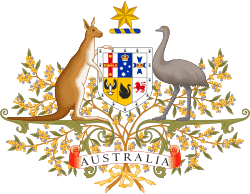Native Title Act 1993
| Native Title Act 1993 | |
|---|---|
 | |
| Parliament of Australia | |
| An Act about native title in relation to land or waters, and for related purposes[1] | |
| Citation | Act No. 110 of 1993[2] |
| Date of Royal Assent | 24 December 1993[2] |
| Status: Substantially amended | |
The Native Title Act 1993 ("NTA") is a law passed by the Australian Parliament the purpose of which is "to provide a national system for the recognition and protection of native title and for its co-existence with the national land management system". The Act was passed by the Keating Government following the High Court's decision in Mabo v Queensland (No 2) (1992). The Act commenced operation on 1 January 1994.
This legislation aimed to codify the Mabo decision and implemented strategies to facilitate the process of recognising native title.
The Act also established the National Native Title Tribunal, to register, hear and determine native title claims.
According to the Australian Government:
The Native Title Act 1993 establishes a framework for the protection and recognition of native title. The Australian legal system recognises native title where:
- the rights and interests are possessed under traditional laws and customs that continue to be acknowledged and observed by the relevant Indigenous Australians,
- by virtue of those laws and customs, the relevant Indigenous Australians have a connection with the land or waters,
- the native title rights and interests are recognised by the common law of Australia.
The Native Title Act sets up processes to determine where native title exists, how future activity impacting upon native title may be undertaken, and to provide compensation where native title is impaired or extinguished. The Act gives Indigenous Australians who hold native title rights and interests—or who have made a native title claim—the right to be consulted and, in some cases, to participate in decisions about activities proposed to be undertaken on the land. Indigenous Australians have been able to negotiate benefits for their communities, including in relation to employment opportunities and heritage protection.
The Act also establishes a framework for the recognition and operation of representative bodies that provide services to native title claimants and native title holders. The Australian Government provides significant funding to resolve native title issues in accordance with the Act, including to native title representative bodies, the National Native Title Tribunal and the Federal Court.[3]
The High Court in Western Australia v Commonwealth (1995) upheld the NTA and struck down a conflicting Western Australia statute.[4] The Act was amended by the Howard Government in 1998 and again in 2007,[5] and by the Rudd Government in 2009.[6][7]
See also
- Native title in Australia
- Aboriginal title
- List of laws concerning Indigenous Australians
- Native Title Prescribed Body Corporate
References
| Library resources about Native Title Act 1993 |
- ↑ "Native Title Act 1993 No. 110, 1993 - Long Title". Australasian Legal Information Institute. Retrieved 4 February 2015.
- 1 2 "Native Title Act 1993 - Act No. 110 of 1993". ComLaw. Retrieved 4 February 2015.
- ↑ Department of Foreign Affairs and Trade (Australia), Indigenous land rights and native title, retrieved 30 January 2012.
- ↑ Western Australia v Commonwealth (1995) 128 A.L.R 1.
- ↑ Native Title Amendment Act 2007
- ↑ Native Title Amendment Act 2009
- ↑ Depart of Social Security - Native Title Amendment Act 2009 - Information sheet
External links
- Native Title Act 1993
- Department of the Parliamentary Library (2003) The Mabo debate: a chronology Accessed 17 February 2009